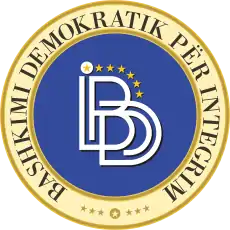Democratic Union for Integration
The Democratic Union for Integration (Albanian: Bashkimi Demokratik për Integrim, BDI; Macedonian: Демократска унија за интеграција, ДУИ — Demokratska unija za integracija, DUI) is the largest Albanian political party in North Macedonia and the third largest political party in the country. It was formed immediately after the country's 2001 armed conflict between the National Liberation Army (NLA) and the Macedonian security forces. The NLA leader Ali Ahmeti is since then the party's president.
Democratic Union for Integration Демократска унија за интеграција Bashkimi Demokratik për Integrim | |
|---|---|
 | |
| Leader | Ali Ahmeti |
| Founded | 2002 |
| Ideology | Albanian minority interests[1] Pro-Europeanism[2] |
| Political position | Centre-left[3] |
| European affiliation | Socialists, Democrats and Greens Group |
| Colours | Blue Yellow |
| Macedonian Parliament | 15 / 120 |
| Mayors | 10 / 81 |
| Website | |
| www | |
In the 2002 parliamentary election, the party won 12.1% of the popular vote (70% of the Albanian vote) and 16 of 120 seats.[4]
From 2002 to 2006 it was part of the ruling coalition along with the Social Democratic Union of Macedonia (SDSM) and the Liberal Democratic Party. In the 2006 parliamentary election, the party formed coalition with Party for Democratic Prosperity and Democratic League of Bosniaks. This coalition received 12.2% of the vote and 16 seats. Although DUI won the largest number of seats among ethnic Albanian parties (13), since their Macedonian governmental partners lost the election, it was not invited by the new Prime Minister Nikola Gruevski to participate in the new government. Its place was taken by the second largest Albanian political party, the Democratic Party of the Albanians. However, after the 2008 parliamentary early election, the party returned to government in coalition with Gruevski's VMRO-DPMNE.
In the 2011 parliamentary election, DUI received 10.2% of the total vote, winning 15 seats, a loss of the 3 seats from the previous election.[5] DUI has the best election result in the 2014 parliamentary election when it received 153,646 votes (14.2%), winning 19 seats, and had the worst result on the next elections in 2016, receiving 86,796 votes.
Election results
Controversy
Skopje Fortress incident
After the foundations of a 13th-century church were found by a governmentally funded excavation within the Skopje Fortress complex, the Cultural Heritage Protection Office actioned a project to restore it in the form of a church museum. The DUI requested the government to halt construction in early 2011, which was ignored. Two weeks later, just under a hundred DUI supporters converged on the site on 11 February 2011, among them three high-ranking ethnic Albanian ministers, and some damaged part of the scaffolding.[6]
External links
References
- Nordsieck, Wolfram (2020). "North Macedonia". Parties and Elections in Europe. Retrieved 16 July 2020.
- "North Macedonia". Europe Elects. Retrieved 16 July 2020.
- Pankovski, Marco; Jovevska–Gjorgjevikj, Aleksandra; Janeska, Sara; Ilievska, Martina; Mladenovska, Simona (2020). The Republic of North Macedonia's 2020 Parliamentary Elections Handbook (PDF) (Report). Konrad Adenauer Foundation, Institute for Democracy "Societas Civilis" Skopje. p. 73. Retrieved 17 July 2020.
- Dieter Nohlen & Philip Stöver (2010) Elections in Europe: A data handbook, p1278 ISBN 978-3-8329-5609-7
- "Conservative Leader Claims 3rd Term in Macedonia". NPR. 6 June 2011. Retrieved 6 June 2011.
- "100 DUI Activists Try to Bring Down Church at Kale Fortress". Macedonian International News Agency. 11 February 2011. Archived from the original on 22 June 2017. Retrieved 12 February 2011.
